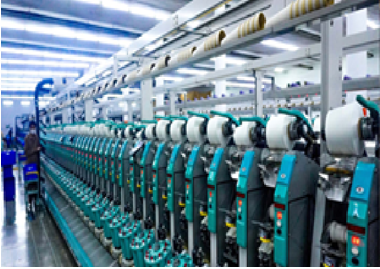INP-WealthPk
Azeem Ahmed Khan
The Pakistani government has proposed a strategic shift in the country’s textile sector from cotton-based production to synthetic and blended fibers, aiming to diversify exports and capture a greater share of the global textile market. The initiative is a central component of the draft Textile and Apparel Policy 2025–30, which seeks to strengthen the country’s industrial base through innovation, product diversification, and investment in modern manufacturing infrastructure.
According to the draft available with Wealth Pakistan, Pakistan’s textile exports are heavily concentrated in cotton-based products, which account for more than 70 percent of total textile exports. The document highlights that this dependence has made the industry vulnerable to fluctuations in cotton production, climatic variations, and volatile input prices. To address these structural challenges, the policy calls for expanding into manmade fibers, blended fabrics, and technical textiles that dominate international demand.
The draft policy points out that synthetic fibers, including polyester, viscose, and acrylic, have overtaken cotton globally, accounting for nearly 74 percent of total fiber consumption. It emphasizes that Pakistan’s limited use of these materials restricts its competitiveness in non-cotton exports, particularly in high-demand categories such as sportswear, outerwear, industrial textiles, and home furnishings. The policy, therefore, seeks to realign Pakistan’s textile production with global consumption patterns and evolving market preferences.
To support this transformation, the government plans to rationalize customs duties and taxes on imported raw materials used in synthetic and blended fabric production. The draft proposes that the Ministry of Commerce and the Ministry of Industries and Production work jointly to facilitate the establishment of local manufacturing facilities for synthetic fibers and filaments through foreign investment and public-private partnerships. This will help reduce dependence on imports and ensure consistent supply of key inputs to domestic manufacturers.
The policy also identifies technical textiles as a new growth frontier. It proposes developing a National Framework on Technical Textiles that will define product categories, set quality and safety standards, and support research and innovation in specialized fabrics used in agriculture, medical supplies, automotive manufacturing, and construction. The framework will encourage collaboration between research institutes, textile universities, and private industry to develop new materials and technologies.
According to the policy document, provincial governments, in coordination with the Ministry of Commerce (MoC), will establish these parks using a public–private partnership model in cities such as Sialkot, Sheikhupura, Multan, and Hyderabad. The initiative aims to improve supply chain efficiency, reduce lead times, and ensure full traceability of trade. The proposed parks will include upstream, downstream, ancillary, and recycling units, offering plug-and-play facilities with reliable utilities, transport links, and shared services.
These will cover effluent treatment plants, water recycling, warehousing, marketing and display centers, logistics infrastructure, workforce housing, medical dispensaries, day-care and training centers, and one-window support services. The parks will also be integrated with economic corridors to enhance trade connectivity and competitiveness in global markets. The policy further states that the MOC and MoIPP, in coordination with provincial authorities, will upgrade infrastructure in existing garment cities and industrial zones through public–private partnerships to support modern manufacturing operations.
To improve product quality and compliance, the draft policy calls for the Ministry of Science and Technology (MoST) to engage international testing firms for setting up internationally accredited and retailer-authorized laboratories within industrial clusters. The initiative will help local manufacturers reduce reliance on costly overseas testing. The MoST will also pursue joint quality certification programs with partner countries and assist both public and private laboratories in obtaining international accreditations, such as FDA and CE.
These accredited testing facilities will strengthen Pakistan’s textile ecosystem, attract local and foreign investment, and improve the competitiveness of its exports in global markets. The document concludes that the transition toward synthetic fibers, technical textiles, and integrated manufacturing facilities is essential for ensuring sustainable industrial growth. It emphasizes that consistent implementation of fiscal, infrastructure, and research incentives will enable Pakistan to position itself as a competitive, diversified, and innovation-driven textile producer in the global market.

Credit: INP-WealthPk













